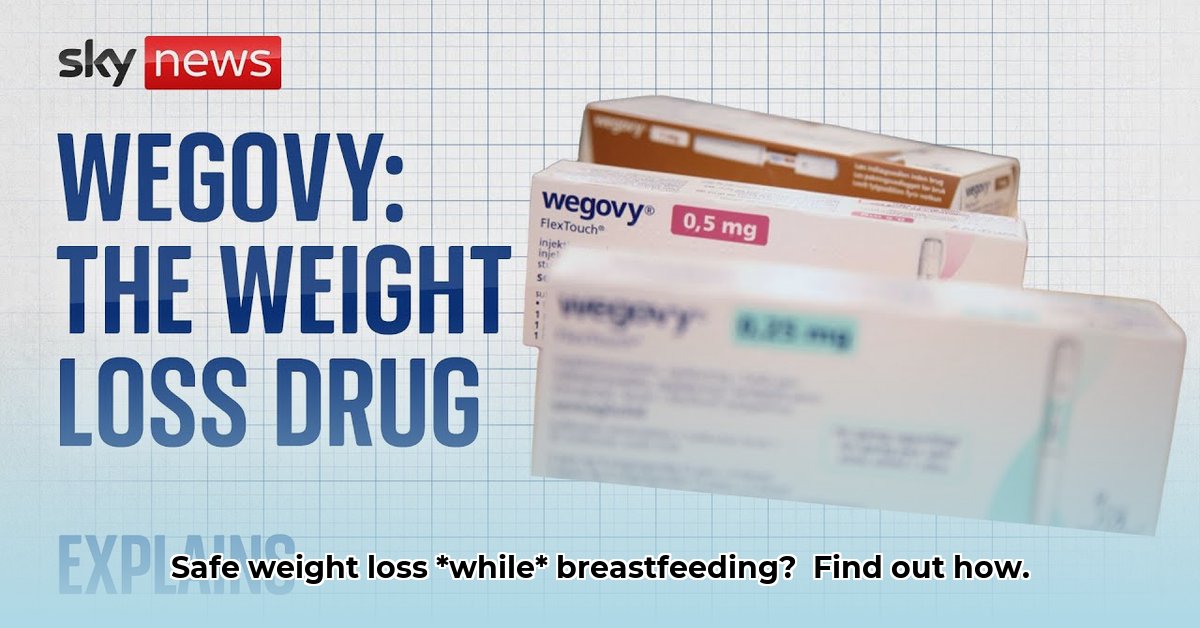
Losing weight after childbirth is a common goal for new mothers, but navigating safe weight loss strategies while breastfeeding can be challenging. This review examines the use of semaglutide, a medication increasingly used for weight loss, during breastfeeding, weighing potential benefits against potential risks. We will also explore healthy lifestyle modifications and the importance of professional guidance in making informed decisions.
Semaglutide: Understanding the Medication
Semaglutide is a glucagon-like peptide-1 (GLP-1) receptor agonist (a medication that mimics a natural hormone regulating blood sugar and appetite). It's used to treat type 2 diabetes and is increasingly prescribed for weight management due to its appetite-suppressing effects. The medication is available in two forms: injectable and oral (Rybelsus).
Semaglutide and Breastfeeding: A Critical Review
The question of semaglutide's safety during breastfeeding remains complex, with limited research available. While some studies suggest minimal direct risk to infants due to very low levels detected in breast milk, particularly with the injectable form, the potential indirect risks associated with appetite suppression cannot be ignored.
Weighing the Pros and Cons
| Factor | Potential Benefits | Potential Risks |
|---|---|---|
| Semaglutide in Breast Milk | Very low levels detected in breast milk (injectable form); likely minimal direct risk | Potential, though currently unknown, long-term effects on the infant; possibility of higher levels with oral formulations. |
| Appetite Suppression | May aid in weight loss | Could lead to inadequate maternal nutrient intake, potentially affecting milk supply and infant nutrition. |
| Long-Term Effects | Currently unknown | Unknown long-term effects on both mother and infant |
| Milk Supply | Potentially reduced due to decreased caloric intake | Reduced milk supply can negatively impact infant development. |
Key takeaway: Current evidence suggests minimal direct risk from injectable semaglutide, with very low levels potentially transferring to breast milk. However, the indirect risks associated with reduced caloric intake and potential impact on milk supply are significant concerns. Oral semaglutide poses a higher risk due to the presence of absorption enhancers.
Healthy Alternatives: Prioritizing Lifestyle Changes
Before considering any medication, exploring lifestyle adjustments is crucial. These methods promote gradual, sustained weight loss while supporting both maternal and infant well-being.
Balanced Nutrition: Focus on a nutrient-rich diet including fruits, vegetables, lean proteins, and whole grains. This ensures adequate nutrient intake for both mother and baby and supports healthy milk production. "A balanced diet is critical for breastfeeding mothers," says Dr. Anya Sharma, MD, OB/GYN at Women's Health Center.
Moderate Exercise: Gradual incorporation of light to moderate exercise, such as walking or low-impact activities, can improve mood, energy levels, and assist with weight management. Consult your physician before starting any new exercise routine postpartum.
Supportive Social Network: Leveraging support from family, friends, or peer support groups can provide emotional and practical assistance during this transition period. "The emotional support provided by a strong network can significantly reduce stress, which can positively impact weight management postpartum," adds Dr. Elizabeth Carter, PhD, Registered Dietitian at Nutrition Solutions.
The Importance of Professional Guidance
Before considering semaglutide or any weight loss medication, consult your healthcare provider (OB/GYN, family physician, or registered dietitian). They can assess your individual health, discuss potential risks and benefits, and help you create a personalized plan tailored to your specific circumstances. They can also help address any concerns about milk supply or nutrient intake.
Unregulated Supplements: A Word of Caution
Avoid unregulated weight loss supplements. These products often lack scientific backing, may contain harmful substances, and pose potential risks to both mother and baby.
The Path Forward: Research and Future Directions
Further research is needed to fully understand the long-term effects of semaglutide on breastfeeding mothers and their infants. Until more definitive data is available, caution and close medical supervision are paramount.
LSI Keywords:
Postpartum weight loss, breastfeeding medication, semaglutide breastfeeding safety, GLP-1 receptor agonists, weight loss after pregnancy, safe weight loss for breastfeeding moms, postpartum nutrition, postpartum exercise, healthy weight loss strategies, maternal nutrition, breastfeeding and medication, infant health and development, impact of medication on breast milk, oral semaglutide and breastfeeding, injectable semaglutide and breastfeeding, risk assessment, benefits and risks of semaglutide, postpartum recovery.